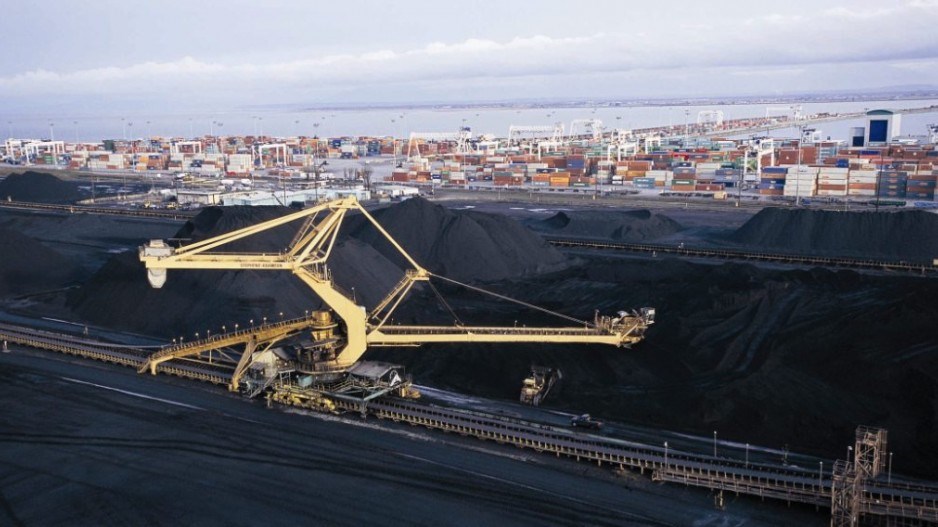Once the dust has settled from the May 9 provincial election, one of the first orders of business for whoever becomes premier will be strategizing for the latest softwood lumber war and renegotiation of the North American Free Trade Agreement (NAFTA).
NDP Leader John Horgan said his first order of business, if the NDP forms government, would be to go to Washington to make B.C.’s case against American countervailing duties on B.C. lumber exports to the U.S.
Christy Clark, on the other hand, threatened retaliation.
The BC Liberal leader asked Ottawa to ban thermal coal exports through B.C. ports – something that would kill the $15 million Fraser Surrey Docks new coal terminal plans and wipe out $100 million worth of business for Westshore Terminals, where American thermal coal accounts for one-third of its business.
Because ports are a federal jurisdiction, the province has no authority to ban exports, but it could impose new levies on thermal coal exports – something Clark vowed to do during the campaign and which an NDP government could use as well.
While Clark’s threat to impose crippling levies on thermal coal exports might have been nothing more than election posturing, it has already had an effect and could be a useful bargaining chip, according to Joe Aldina, a New York-based energy analyst specializing in coal for S&P Global Platts.
He said the mere threat of new levies on America’s already troubled thermal coal industry caused a stir in Washington.
“I know from my contacts that I was just talking to, already they’re lobbying and having conversations behind the scenes in Washington,” Aldina told Business in Vancouver. “It’s certainly got people’s attention.”
And it could be held out as a bargaining chip, should NAFTA talks go south.
“It may not behoove the Canadians to really make this an issue until the NAFTA negotiations this summer, but then if that falls apart, then all bets are off,” Aldina said.
“It’s a bargaining chip, as much for the fact that it blocks coal exports as for the fact that it grabs headlines about coal, and that’s so important to Trump, at least optically.”
He referred to the fact U.S. President Donald Trump made the revitalization of America’s coal industry a major platform plank.
Most American coal companies produce coal for the domestic power market. But a few have come to rely on exporting coal to Asia through British Columbia.
British Columbia is a major metallurgical coal producer, so it has the export terminals to handle large volumes of coal. Metallurgical coal is used to make steel, not generate power.
There are no major ports on the U.S. west coast for American companies to ship their thermal coal through to Asia and Chile, and several attempts to build new ones have failed, due to a growing public antipathy toward thermal coal. B.C. terminals like West-shore in Delta and Ridley Terminals in Prince Rupert have become important gateways for struggling American thermal coal producers.
Last year, 26 million tonnes of metallurgical coal and 6.6 million tonnes of thermal coal moved through the Port of Vancouver. In 2016, more thermal coal than metallurgical coal moved through Ridley Terminals.
In an attempt to capitalize on the lack of terminal capacity for coal in the U.S., Fraser Surrey Docks proposed building a new $15 million coal export terminal that would have a capacity of four million tonnes annually. It was permitted in 2014 but has been held up in Federal Court, after it was challenged by environmental groups.
The margins for thermal coal exports are already low, Aldina said, so a new tax could kill that project.
“It potentially prevents exports from going through Westshore, but it would be disastrous for Fraser Surrey,” Aldina said. “It would mean, probably, a decision of not moving forward with the investment.”
But does B.C. even have the authority to levy new commodity-specific tax?
Elizabeth Edinger, a constitutional law professor at the University of British Columbia’s Peter Allard School of Law, said it does, although it would likely be something the courts would ultimately have to decide. The province could decide, for example, that the carbon tax should apply to thermal coal, because it will ultimately be burned to produce power. Currently, the carbon tax applies only to combustion sources, but there has been pressure to extend it to fugitive emissions from natural gas wells and other non-combustion sources.
“The province does have legislative jurisdiction to impose direct taxation within the province to raise revenue for provincial purposes.”
However, Edinger added that it would likely be challenged in court, and the government’s motivation would likely be called into question.
“We’ve got the power to impose direct taxes, but she [Clark] has already talked about why we’re doing it, and that tends to colour the ultimate legislation.”
In response to Clark’s targeting of thermal coal exports, West-shore Terminals last week wrote to the prime minister asking him not to ban thermal coal exports. The company said thermal coal exports generate $100 million annually, employ 100 people and generate $12 million in taxes annually.




